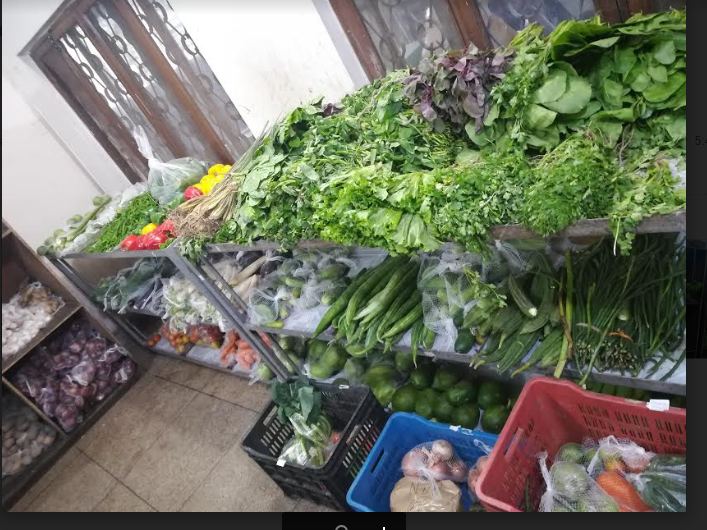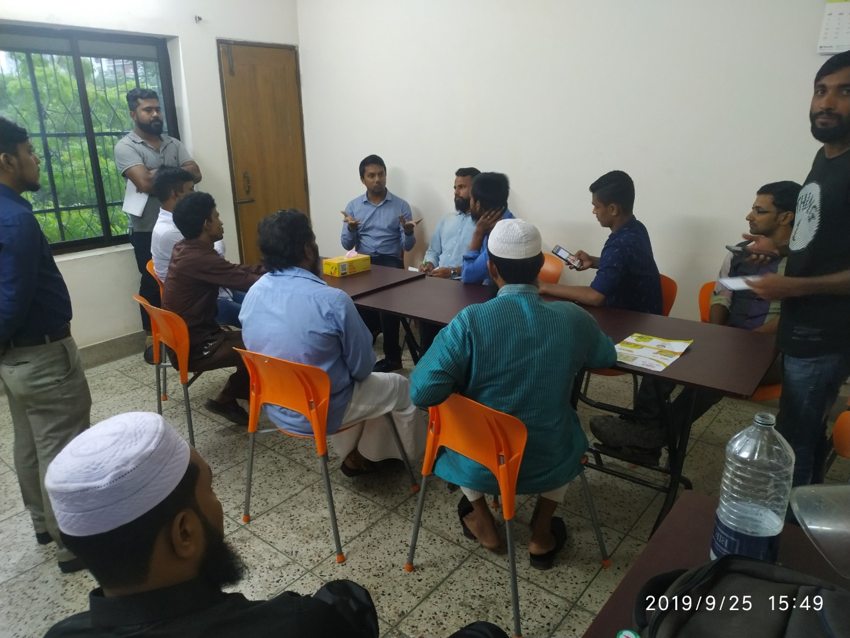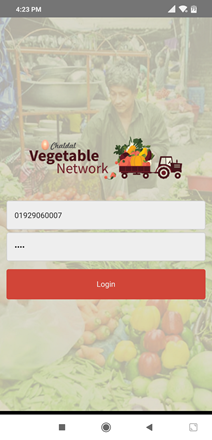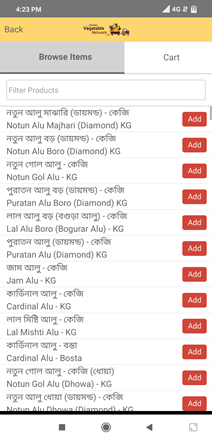
The vegetable and grocery supply chain in Bangladesh is littered with inefficiencies. The traditional model is suboptimal. There is little to no traceability in the entire supply chain. These inefficiencies affect all of us all in one way or the other regardless of whether we consciously realize it or not.
Farmers suffer due to wastage and a system that seldom guarantees a fair price. Retailers suffer due to frequently changing market dynamics. Consumers suffer due to compromised quality of fresh produce and unpredictable price fluctuations.
The traditional market has been addressing these inefficiencies with a lot of rather bad practices such as using chemicals before or after the harvest to keep products fresh and increasing prices at different stages of the supply chain which, instead of solving these challenges, exacerbates them.
This is where the Chaldal Vegetable Network (CDVN) comes in. Chaldal Vegetable Network connects farmers with retailers directly. In the process, it improves the chance of getting a fair price for farmers, improves lifestyle and options of product return for retailers, and ensures traceability in the entire supply chain, thus ensuring the quality of produce and price predictability for customers.
Chaldal Vegetable Network operates completely independently from Chaldal’s marketplace business. The network solely focuses on bulk supply and B2B.
The key feature Chaldal Vegetable Network brings in is logistics efficiency. When logistics in the entire supply chain is improved, it can contribute to improving the quality control process, packaging, and price.
CDVN offers a long list of benefits to small-holder retailers. Retailers can order daily instead of buying it for three days at once, which in turn ensures quality for customers. Chaldal delivers the product at the doorstep of retailers every morning, so they don’t have to go to Kawran Bazar or other wholesale markets in Dhaka at the early hours of the day to buy vegetables in bulk.
The consumers gain because there is more traceability in the forward market and logistics process, which improves the price and quality of the product.
“If we can ensure traceability in the supply chain and transaction of retailers, there are chances of more investment coming in for farmers and retailers and in the infrastructure and better packaging facilities,” says Naveed Akbar, a Senior Director of Strategic Initiatives at Chaldal, who leads the project. “If we have better infrastructure and better packaging, then we have a better quality product, the benefit of which consumers and farmers both would enjoy, eventually.”

The current business model of Chaldal’s e-commerce business is that the company delivers good quality groceries to households at a competitive price. Over the years, Chaldal has been able to achieve a clear advantage when it comes to dry and frozen groceries such as milk, rice, etc. Chaldal’s perishable item business was small until recently which made it difficult for the company to have any power on supply chain and thus the quality of fresh produce. With CDVN, the company has found a way to successfully break into perishable items sourcing and distribution market and in the process improve the entire supply chain for everyone involved.
“For purchasing dry groceries every month, people find us convenient,” says Mr. Naveed. “But one of the challenges we were facing was reaching a critical volume on vegetables. Since we did not have a volume of vegetables, fish and similar perishable items, we were directly sourcing from the market such as Kawran Bazar and supplying to our customers.” The quality was not always great. As a result, there were a lot of complaints from customers. “You can easily maintain the quality of chanachur because it is simply a well packaged and processed product and there is a standard defined by certification authorities that the manufacturers need to comply with. But there is none for vegetables. Since we were collecting it from the market instead of farmers, we had limited control over the product and supply chain as it was coming through the traditional supply chain.”
Chaldal was in a precarious situation. On one hand, the company’s brand standing in the market was facing a challenge due to compromised vegetable qualities. Many customers were not relying on Chaldal for fresh vegetables. On the other hand, Chaldal customers’ orders in small SKUs such as one cauliflower, one KG green chilis and so on. With that volume, Chaldal could not supposedly play a key role in the supply chain of fresh vegetables. At the same time, the company came to see the challenges small-holder retailers face in the traditional supply chain.
From that standpoint, Chaldal started CDVN to address these challenges. The company realized that it could only play some role in the supply chain and ensure quality for customers if it could purchase in bulk. “We could have better control over standardization and quality if we ordered in bulk,” says Mr. Naveed. “We could then purchase directly from the collection centers. We realized that if we have to do this, only targeting households would not do the job for us. We would need bigger orders.”
That’s how Chaldal Vegetable Network (CDVN) was founded.
The network formally launched in January 2019 with a small team. The idea was to offer fresh vegetables to local and small-holder retailers - a B2B vegetable business. The first channel for CDVN is the Chaldal marketplace itself, and the second channel is retailers and grocery stores.
Over the past months, the network has seen healthy growth. Today, it has a dedicated sales team that works with retailers as customers, closely. One sales representative of CDVN works with a number of retailers to collect orders daily through automated software and by the end of the day, CDVN gets aggregated data of daily demand for the next morning. Then according to orders, CDVN sources the products and delivers to the retailers’ door-step before 6 am in the next morning.
Today, CDVN has a registered retailer base of over a thousand vegetable retailers across Dhaka and the number is growing every day.
For now, individual retailers can order over the phone through CDVN sales representatives. The company says it is working on a beta version of the web platform and mobile app as well which will enable retailers to order online directly.

After the launch of Vegetable Network, Chaldal has established three collection centers for sourcing in Mymensingh, Narsingdi, and Comilla, respectively, and four additional collection centers in Dhaka. “We have dedicated teams and collection hubs in these collection centers,” says Mr. Naveed. “We get information daily from these collections hubs regarding the prices of different products at different collection hubs. We collect the price and match it with the retail price of Dhaka markets and then we collect the products. After we receive the products in Dhaka warehouse, we do the grading, sorting, and packing before delivering the vegetables by 6 am the next morning to the retailers.”
Chaldal Vegetable Network supplies about 1.5 tons to 2.5 tons per day to its consumer business segment through the Chaldal website. It supplies around 9 metric tons to 16 metric tons to retailers per day.
Out of a thousand retailers that CDVN works with, the company currently supplies to around 100 retailers daily. The company says each retailer takes deliveries every alternative day. CDVN offers the same market price to retailers. “Our commitment to retailers is that they are getting our product at the same price of what it is in Kawran Bazar,” says Mr. Naveed. “Our revenue comes mainly from delivery charges and margins from supplying vegetables from rural collection centers to urban retailers directly.”
Chaldal Vegetable Network currently covers some 40 markets in Dhaka on the eastern side of the city from Basabo to Uttara. From January, the company says it will expand to the western part of Dhaka which is from Azimpur, Mohammadpur to Mirpur with separate operations for the east and west part of the city.

The majority of small-holder retailers, who sell vegetables in Dhaka, collect it from Kawran Bazar. The entire process of this collection is unhealthy for them and adds little value to their long-term sustainability.
Let's take a look at how small and micro retailers collect Vegetables from the traditional markets. These retailers do transactions throughout the day. They usually invest between 30,000-70,000 taka for vegetable purchasing daily - these are medium to large retailers. There are smaller ones as well who operate with much smaller capital.
A typical small retailer’s day starts at around 3:00 am, they wake-up despite the unbearable cold, go to Kawran Bazar, and collect vegetables. By the time they return from the Bazaar with vegetables, it is already morning transaction time. They seldom get another chance to rest. Instead, they organize the shop and start selling. They take a small break after lunch when someone from their family helps them to run the shop. Then they continue again from about 4 pm. The cycle continues.
Moreover, these retailers are always at the mercy of the market. First, the price goes up and down without prior notice which affects them severely but they seldom have the power to cause any counter effect.
Second, most of these retailers transact in cash. Many of them don't have any bank account. As a result, they are vulnerable to changes and shocks in the market. If anything goes wrong, they simply go out of business. Since they don't maintain any record of their business, they can't get any loan or investment from any financial institutions. Because a financial company has no way to judge these businesses and their viability without record.
Chaldal Vegetable Network helps change these dynamics. When small-holder retailers work with CDVN, they get a couple of benefits.
First, CDVN collects orders a day ahead. “Every day we collect orders by 8:00 pm, which means they don't need to rush at 3 am to collect vegetables,” says Mr. Naveed. “We are delivering our products exactly at Kawran Bazar price at his gate. When he receives he does the QC himself. We have a transparent return policy where if he does not find the price or quality satisfactory, he can return within a certain time in the morning, and we help him collect replacement orders as well.” Such ordering and convenient delivery process have helped the retailers.
Second, CDVN now offers eight to ten hours of credit facilities to retailers. They can make the payment at the end of the day after selling the product. This is an incredible benefit that eases the burden of cash worry on these retailers. Now they have a way back if something goes wrong in the market. “If someone had a major accident, lost his savings, he can get back because he can restart with our credit facility and clawback again,” says Mr. Naveed. “He can take our products, sell, repay us and keep the profit.”

Third, CDVN maintains a transaction profile of each retailer, which, to a certain extent, portrays the state of their business. When a retailer is doing business with Chaldal Vegetable Network, it means they have a transaction profile with Chaldal, which they can use for getting finance from Banks and other financial institutions. “We create a transaction profile for each retailer,” says Mr. Naveed. “As a result, they have historical transaction records for their individual transactions, which can be valuable data for banks/financial institutions, who are willing to offer credit facilities to viable small and micro-businesses like vegetable retailers with an appropriate business model and transaction history. We have already sent profiles of 120 retailers to IDLC and IDLC is very much interested to offer them a loan as long as they fit the credit-worthiness standards of IDLC. It was encouraging to see that, seeing the business viability of providing access to finances to smallholder retailers, IDLC has come up with a new product called Unnoty for retailers last year, and the NBFI (non-bank financial institute) is now looking into Vegetable Network retailers to offer credit finance facilities.”
Fourth, in the long term, as CDVN manages to establish collection centers across the country, the company says it will be able to predict price through proper information gathering process and will be able to bring price and trading efficiency in the vegetable value chain.
The company cites the recent incident when onion prices in Dhaka went up heavily and Chaldal could still offer onion at the lowest price in the market because of its sourcing strength.
“As we grow our business and have more collection centers across the country, we will be able to do two things,” says Mr. Naveed. “One, we will be able to ensure the best quality products through our reliable collection centers and bulk trading partners. And two, have some control over the supply chain where we could encourage farmers to not spray on products five days before plucking. We can take better QC measures.”
The company says currently it can influence quality at a limited scale. But this influence is likely to grow as its business grows. “The moment we have a dedicated demand and a better relationship with farmers,” says Mr. Naveed, “we can plan our supply chain better. Today, nobody asks a farmer for safe vegetables. If you buy regular vegetables at 33 taka and offer the same price for a safe vegetable that was cultivated better and organically, there is no incentive for the farmer to do the safe vegetables. When we become established and order a certain volume and offer a better price for safe products, the market norm will change and we will see farmers and traders converting their existing practices to better and safer habits. Such behavioral shift is what we want to see in the coming days.”
Through the Vegetable Network, Chaldal is empowering three groups of people - farmers, retailers, and customers.
Farmers now can get a better price. Their product wastage has been reduced. They get a committed buyer and a fair price.
Retailers can have a better life. They can have better sleep and family time. They get a credit period that enables them to endure market shocks. They get a 100% return policy. They now have a transaction history that they can use to get financing from micro-finance institutions, banks, and other financiers.
Customers now have fresher products and a fair price. In the long run, customers will have much more price stability. There will be limited surprises.
“Agriculture backward market has become quite organized in Bangladesh in the last decade,” says Mr. Naveed. “The seed, feed, fertilizer - these markets are now way more structured than any time before and offering quality products and services to farmers at competitive prices. However, the secondary market is not that organized as yet, which is farm to fork. With the Chaldal Vegetable Network, we are taking a small effort to contribute to that change. There is a need for organizing in the secondary market. We believe CDVN can play an important role with such initiatives.”
The company says the response from various stakeholders has been great. “We are not only getting good responses from private companies,” says Mr. Naveed, “we are also getting great responses from development agencies who have been trying to improve these supply chain practices and processes.” The company says it is now eyeing to start a Chaldal Aqua Network for fish and related perishable items.
In the last few years, Chaldal has focused solely on the consumer market. It is the leader in the online grocery retailing in Dhaka. The company says that since it has come a long way in terms of its consumer business, it now aims to work with and help small businesses and suppliers grow.
“When we are getting into these vegetables and fish business,” says Mr. Naveed, “we are going to deal with a lot of small businesses both as suppliers and retailers and we want to help all of them.”
While the number of small businesses Chaldal is working with is limited to retailers today, the company sees that it is going to change in the coming years. Chaldal currently works with farmers and retailers. In the future, it will work with traders, small warehouse owners, transport owners, and other stakeholders.
For the Chaldal Vegetable Network, it is just the beginning. CDVN has already started planning to expand the network to rural areas and work with retailers across the country. The company says it is already in conversation with partners to see how it may approach the country-wide expansion of the Chaldal Vegetable Network. If this happens eventually, it will hopefully change the face of the vegetable supply chain in Bangladesh.
